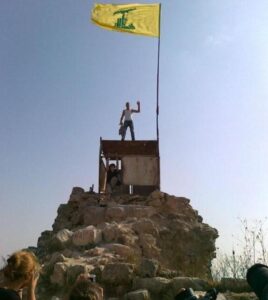
Meeting Hamas
Thursday evening, July 29, one part of the delegation met the Hamas leader of Beirut and Saida, Abu Achmad Alfatel while the others remained in Beirut to visit Al Akhbar Newspaper. Abu Achmad Alfatel explained the delicate situation of the Palestinian people in Gaza to the participants. Since the elections in 2006, political conditions have tightened through the extended embargo and the general isolation from the rest of the world, which makes daily life very difficult. It seems to him that the western governments were ready to accept the elections, but not the unexpected result – this gives a clear idea of western perception of democracy. Due to the 2009 war in Gaza 70% of the region is destroyed, there exist hardly any infrastructure: ‘We live like in stone age’, he said. But still people keep their resistance, not willing to give up their main goal to liberate Palestine from Israeli Occupation. Regardless of all the problems they have to face everyday, Abu Achmad Alfatel considers the political situation of the Westbank to be worse than that in Gaza for the don’t only have to suffer from the Israeli occupation but, according to him, also from the occupation of the Palestinian authority. From his point of view the Fatah administration are American puppets. Since the Fatah ceased to be part of the resistance movement there is a great gap between them. He pointed out that Hamas are opened to the whole world, regardless of ideological differences, as long as they support their main cause, the resistance against Israeli occupation. He described the relation to the PFLP as good and cooperative, standing on the same side, i.e. opposing the Palestinian authority.
Everyday life in the Camp gets harder
Saturday was the day when the delegation had to face unexpected problems. First of all one of the participants became sick and was taken to the hospital in the camp. Due to that incident we had the unexpected possibility to get to know the health system through our own experience additionally to the interviews for the documentary film. Luckily, the participant recovered after spending one night in hospital.
Furthermore two of the participants could not enter the camp for half of the day due to some unknown problems at the checkpoint. There might be a connection between the tightening of the political situation in Lebanon (following the Special Tribunale for Lebanon, a UN-backed body to investigate the assassination of prime minister Rafiq Hariri in 2005) and the increase of the controls at the checkpoint by the Lebanese army. In the evening, there was a football match between the Sumud delegation and the boys from the camp, where the Palestinian boys succeeded curtly. Later on the delegation celebrated a birthday at the beach and allowed themselves some relaxing moments.
Improving the film work

On Sunday the European delegation made the biggest improvement for their documentary. They managed to make the two major interviews with the main teenagers, concerning their life in the refugee camp and everything which is connected with the difficult surrounding. These interviews will form the red line of the documentary, all other elements to be shown will be connected with the main issues they pointed out. Besides that another group started to collect single moments of the film for a kind of summary of the impressions they made in the camp. Besides the work for the film, the participants started to plan the final presentation of the teenager-shortfilms, which is supposed to include a celebration where the media and all political fractions of the camp are expected to participate. An organizing group for that event was selected and an invitation card was designed.
In the afternoon a meeting of all participants was held in order to summarize the past week. This meeting was important to get a feedback and also to improve the organization of twenty people living together in a very decreased area. Luckily existing problems could be discussed and solved.
Visiting the Ghassan-Kanafani foundation

On Monday some of the participants went to see the Ghassan-Kanafani-school. Kanafani was a legendary Palestinian writer, poet and political activist with the PFLP, who was killed by a Mossad car bomb in 1972. After his death, his wife Anna Kanafani continued his cultural work by raising a foundation. The school is part of this foundation. It includes a kindergarden, a primary school and a school for handicapped children and is opened to both Lebanese and Palestinian children. The school’s conditions are very good, they have a very high level of infrastructure and the teachers seem to put lots of effort to support the children through artistic and cultural projects. For the delegation this school was an interesting project because the spirit of a resisting Palestinian writer, who once was a teacher himself and always stressed the importance of improving the situation for the next generation of Palestinian, is carried on through this school.
Meanwhile the teenager film workshop under the leadership of Arab Lotfi continued. After some days of randomly experimenting with the camera it seems like the teenagers had now come up with their own precise ideas of what they wanted to express through the camera. Also the work with the documentary by the European delegation enhanced and has now coming to an end. The big progress of the documentary is especially due to one very active participant, who has worked as a cameraman and luckily could share his knowledge with the rest of the delegation.
Discussing strategies of resistance
 : Solidarity work goes on »
: Solidarity work goes on »